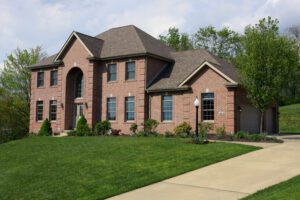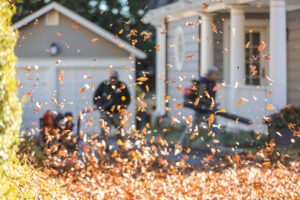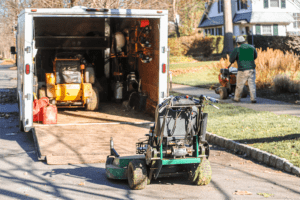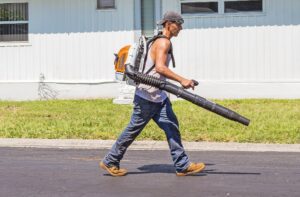One of the most interesting aspects of societal change is that it seems nearly impossible to achieve while one is going through it, and yet inevitable in hindsight.
Take cigarette smoking in restaurants, for example. As recently as the 1970s, smokers ruled the restaurant and bar scene, and the needs of non-smokers were either ignored or took a back seat. It was considered untenable to ban smoking altogether in restaurants, and unthinkable in bars. Customers would stop coming, they feared, and restaurants and bars would go out of business. None of those predictions came true, of course. By the 1990s, new laws were passed and people accepted the change. It’s difficult now to imagine dining out in smoke-filled rooms.
A 21st century view of landscaping

Anthony Lunn, a longtime Princeton resident and co-founder (along with his wife Phyllis Teitelbaum) of Quiet Princeton, believes the use of polluting, gas-powered lawn equipment – along with the practice of creating what he calls “plastic landscaping” – will soon become a thing of the past. The transition away from the preternaturally manicured lawn may even be marked as one of the more important societal changes of the 21st century.
The seeds for this transformation have been planted in Princeton, and a coalition of people and organizations is working hard to promote a variety of sustainable landscaping practices that protect the health of both people and the local environment.
Called Changing the Landscape: Healthy Yards = Healthy People, this coalition is pioneering a collaborative and comprehensive approach. While many towns throughout the country have instituted or are considering gas-powered leaf blower restrictions, Princeton is unique in bringing all stakeholders to the table to create broader solutions that consider all viewpoints – those of residents as well as landscapers, who could be impacted significantly by ordinance changes, yet often do not have a voice in creating policy.
The Changing the Landscape project is backed by a one-year grant from Partners for Places, as well as additional funding from Princeton resident Eve Coulson and an anonymous donor. The project team includes co-partners Sustainable Princeton and the Princeton Environmental Commission, along with Unidad Latina en Acción NJ, the Latin American Legal Defense and Education Fund, Quiet Princeton, Rutgers School of Public Health, the Rutgers Environmental Stewards program, and several Municipality of Princeton departments and commissions, including Human Services, the Board of Health, and the Civil Rights Commission.
Not a simple undertaking

Restricting gas-powered equipment sounds like a mere stroke of the pen on a new ordinance, but it is a complex process that brings up some thorny issues. It’s certainly an important step in moving toward sustainable landscaping practices, but it also requires educating and inspiring homeowners to see their yards as mini ecosystems rather than pristine showcases. It may also take some funding and other support to help small- to medium-sized commercial landscape companies finance the transition to electric battery-powered equipment.
“Whatever amendments we make to our ordinances, we have to accept that some landscapers may need to raise their prices,” says John Heilner, who chairs the Immigration Committee in his role on Princeton’s Human Services Commission. “In addition to the financial investment required to buy new equipment, labor costs could go up as well. With current technology, electric leaf blowers are not as powerful or efficient as their gas-powered equivalents, and more labor-intensive practices such as raking and sweeping may be necessary.”
Heilner adds, “Yes, this is all good for the environment, but there is a cost. Homeowner education about the benefits of sustainable landscaping practices is crucial if we are to make this work.”
Fredy Estrada, owner of Dogwood Landscaping and steering committee member of the Changing the Landscape project, agrees. “There will always be people who like a more manicured look,” he explains, “and we must satisfy our customers or they will just hire someone else. On the other hand, there are customers who I believe would be interested in sustainable practices and more natural-looking lawns if they knew more about it. They might even be willing to pay a little more because of the health and environmental benefits.”

Estrada is also concerned about multiple pressures on the landscaping industry right now and believes the timing may not be right for gas-powered equipment restrictions and other changes. One problem, he says, is that the landscaping industry is suffering from the same pandemic-induced staff shortages that other industries are experiencing right now. He says most landscape companies he knows are operating with reduced crews and that it’s difficult enough to get the work done now without adding labor-intensive requirements and the financial burden of purchasing new equipment and costly electric batteries.
Other steering committee members believe that electric battery technology is improving by the day and that there are fuel savings and other advantages to electric equipment that could offset at least some of the transition costs. And a few landscape companies have already made the switch to all-electric.
“The Changing the Landscape project is an opportunity for all members of the Princeton community to come together and address these issues,” says Christine Symington, Program Director, Sustainable Princeton. “It would be simpler to change policy without careful consideration of the consequences. It takes time to engage directly with our historically excluded community members to understand how the change will impact them, but it is the right thing to do.”
Why now?
The Princeton Environmental Commission (PEC) has been working for years on educating community members about sustainable landscaping practices – how to enrich the soil on their properties by leaving the leaves, for example, and how to reduce their use of toxic pesticides and herbicides.
Then, along came a pandemic that forced many residents to work and attend school from home. Suddenly, they were more aware of what their landscapers were doing and increasingly cognizant of just how loud and disruptive gas-powered lawn equipment could be. The incessant noise was disturbing their peace and affecting their ability to hold virtual meetings, focus on work and school assignments, and hold normal conversations. It was even adversely affecting people’s mental health.
In 2020, Quiet Princeton presented to the PEC a report that was produced by Quiet Communities, a national organization, called “Covid-19 and Gas Leaf Blowers: A Lethal Combination.” The report documents the hazards caused by the two-stroke engine used in gas leaf blowers, especially for people who get Covid-19.
Last fall, Princeton residents started bringing their leaf blower complaints to PEC meetings, and the PEC began discussing the issue with Councilmember Eve Niedergang, who is the PEC liaison on the Princeton Council.
Reaching consensus on ordinance amendments
 In the transition to sustainable landscaping practices, the PEC has recommended that existing ordinances be amended as a first step. Several virtual and in-person meetings were conducted in Spanish, English and ASL with landscape company owners and crew members, the mayor, council members, and PEC representatives to hash out a consensus around such things as seasonal restrictions on gas leaf blowers. As a result of these discussions, proposed amendments will likely include enhancements to the landscaper registration process and a redefining of the months and hours that gas leaf blowers can be used. Although not all details have been decided on, the PEC recommendations address concerns expressed by landscapers and residents, including those who handle their own lawn care on weekends.
In the transition to sustainable landscaping practices, the PEC has recommended that existing ordinances be amended as a first step. Several virtual and in-person meetings were conducted in Spanish, English and ASL with landscape company owners and crew members, the mayor, council members, and PEC representatives to hash out a consensus around such things as seasonal restrictions on gas leaf blowers. As a result of these discussions, proposed amendments will likely include enhancements to the landscaper registration process and a redefining of the months and hours that gas leaf blowers can be used. Although not all details have been decided on, the PEC recommendations address concerns expressed by landscapers and residents, including those who handle their own lawn care on weekends.
The project partners hope to have the amendments introduced at Princeton Council this fall, followed by a period of public comment and a public hearing. All community members are encouraged to weigh in, including landscapers who work in Princeton.
“We are shaping policy from the bottom up,” says Niedergang. “What was first seen as a noise issue has become a much broader effort that will benefit the whole Princeton community. Our goal is not just to get people to replace gas-powered leaf blowers with electric ones. Our aim is to get people to think about their properties as ecosystems and work toward more sustainable practices, such as welcoming pollinators with native plants and preventing runoff and soil erosion by installing meadows and rain gardens – in other words, getting away from that vision of an immaculate, leafless, lifeless lawn.”
Protecting workers
Another goal is to improve the health and safety of landscape workers by enhancing the existing landscaper registration requirements and urging workers to use protective equipment, such as gloves, masks, and ear protection.
“A review of the hazards suggests that landscapers working in traditional lawn care are subject to health and safety risks,” notes Betsy Marshall, PhD, an environmental and occupational epidemiologist with the Rutgers School of Public Health and a steering committee member for the Changing the Landscape project.
These risks include hearing loss and other chronic diseases associated with excessive noise, exposure to chemical pesticides, gasoline vapors, sun, heat, and certain types of plants, as well as injuries related to the use of heavy equipment. “Improved training and management can reduce some of these risks, but removing sources of risk – like excessive noise – is always more effective, and preferable,” adds Betsy.
While enforcing the amended equipment and registration ordinances will be important, Niedergang says she wants enforcement to be educational rather than punitive and, if possible, any fines distributed to a fund that supports the transition to electric and battery-powered equipment.
As the tagline “Healthy Yards = Healthy People” suggests, sustainable landscaping can play an important role in the future health of the Princeton community, but we need the participation of all stakeholders to make it happen.
To voice your opinion or provide suggestions about the ordinance changes, please contact Eve Niedergang at eniedergang@princetonnj.gov.

